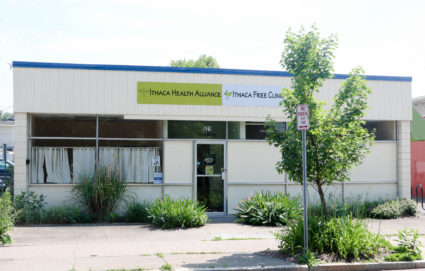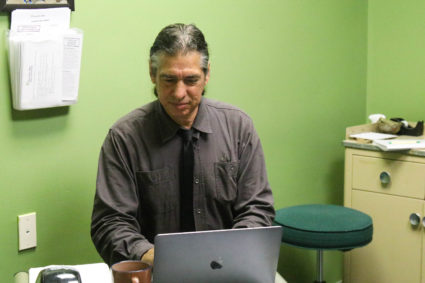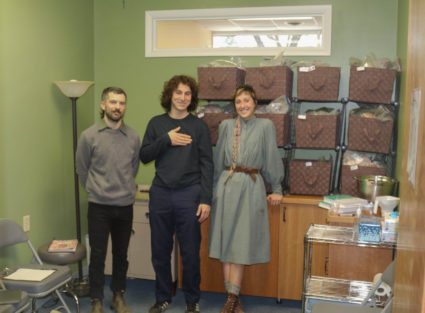
Walk Like A Clinician
Lessons Learned Working at the Ithaca Free Clinic #1
Patient Agency and Useful Questions
I have been working as a clinical herbalist at the Ithaca Free Clinic for the past 12 years. It is a continual learning experience on many levels and from many perspectives. I recently started putting together some of the ideas I feel I have learned while working there. Thank you to the current apprentices for helping with this.
This will be the first of a number of similar posts. I am partially writing this for myself to consider what I am learning, as it helps me to continue to improve my skills as an herbalist, health provider and human. And hopefully, it has interest for others reading this.
Patient Agency
The concept and practice of patient agency is important in health care. It describes helping empower individuals to be a part of the decision making process for their treatment and other aspects of their health needs.
Many people I see feel upset, frustrated, minimized and angry by the way they have been treated in the medical system. I am not trying to place blame as there are many caring people involved at all levels, but the experience of being treated dismissively is common.
While there is not much I can do outside my sphere at the free clinic, I hope to help patients feel that they can have more autonomy about their health.
During a consultation, I try to ask questions that help people understand the nature of their condition and their options in going forward. There are many questions and approaches we can use that can encourage patient agency. And hopefully this helps them become better advocates for themselves and/or others.
I worry that this discussion may sound patronizing, or self-promoting. But I write this in the hope that it is seen as widening the discussion amongst herbalists and allied healthcare workers to help provide safe environments, and increase informed consent.

Please note-this is a list of possible questions and approaches. A lot depends on the individual as well as the practitioners’ relationship with the individual.
- Education and information are helpful, but it is also possible to over inform.
- Check in with patients and see if they are interested in your explanations and what level of information they are interested in.
- Let people know why you are asking them specific questions
- This can help demystify the consultation and the questions holistic practitioners may ask
- This is especially helpful when asking questions that are not obviously involved with their immediate health concern.
- For example, I might ask someone with chronic knee pain how well they are sleeping. After asking this, I could say, “I am asking you about your sleep as the body does a lot of its healing while we sleep. And I was wondering if you regularly sleep soundly as this may influence the recovery of your knee.”
- This helps make sense of why we ask certain questions and inform how different aspects of our lives can influence our health.
- Remember to check in to make sure you are not over-educating.
- Similarly, if I am writing something down during a consultation I can explain the importance of what I am writing.
- “I am writing this down because knowing that you were hospitalized after slipping on ice when you were young may offer insights into why you now have chronic headaches.”
- When asking certain types of questions it is respectful to let a patient know they don’t have to answer it.
- “I realize that this next question is personal, please feel free to not answer it”.
- Your voice and body language should be clear that they really do have a choice whether to answer or not.
- It is even more important to get consent where touching is involved such as with palpating an injury.
- Explain why you are performing a procedure so they can better understand about their condition.
- “I am feeling around your calf to see whether the enlargement is due to inflammation or edema which can lead to two very different diagnoses and treatments.”
- Asking open-ended questions can be helpful
- “How can I help you?”
- “Where do you want to start?”
- A question I find helpful at times is ‘what is your concern about your condition?’
- This allows discussion about where to go with the treatment as well as discussing the fears and concerns associated with a specific health problem.
- ‘How do you feel about your health’ is a useful question to open the door into more insights in how they feel about their physical, emotional and mental health.
- A very useful question is “If the treatment could change one thing, what would be different”, or ‘If I could magically but realistically change one thing, what would be different’?
- The answer can be insightful as it can help someone try to see themselves healthy and what that would look like.
- This can help offer direction on how the treatment could proceed.
- It invites thoughtfulness into the discussion and has the patient evaluate their health from a slightly different angle.
- Letting people know what you are giving them and why
- This is an important time to not over-educate, but one can ask at what level the patient is interested about their herbal medicines.
- It can be a simple explanation such as ‘ Wild cherry is for your cough, Elecampane is a useful lung tonic, the Osha is to help kill bacteria and the Licorice is an antiinflammatory and also helps with the mucous lining.
- You can also describe why they are taking certain preparations and dosage.
- ‘The medicine is in a tincture because alcohol is helpful for extracting the medicinal parts of these plants’.
- ‘I am suggesting you take it three times a day as this keeps the medicine continually in your body.”

